Camille (1936)
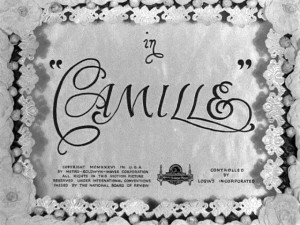 Here’s the idea behind “A Canadian, an American, a Lawyer, and an Elitist”: Rhett’s favorite movie is Meatballs 4, Shawn has an unhealthy fixation on Resident Evil, Richard scoffs at anything that isn’t pretentious and hoity toity, and Adam is a prick who hates everything. We all watch far too many movies, and spend our time analyzing them. So we each watch the same movie, write our analysis of them, and then go to a chat room to discuss it, unaware of what the others have written. A warning: if you haven’t seen the film we are discussing, it may not be best to read this article, because it is spoiler heavy.
Here’s the idea behind “A Canadian, an American, a Lawyer, and an Elitist”: Rhett’s favorite movie is Meatballs 4, Shawn has an unhealthy fixation on Resident Evil, Richard scoffs at anything that isn’t pretentious and hoity toity, and Adam is a prick who hates everything. We all watch far too many movies, and spend our time analyzing them. So we each watch the same movie, write our analysis of them, and then go to a chat room to discuss it, unaware of what the others have written. A warning: if you haven’t seen the film we are discussing, it may not be best to read this article, because it is spoiler heavy.
As is the case with most of the Elitist articles, this was written in 2005, so please keep that in mind when reading it.
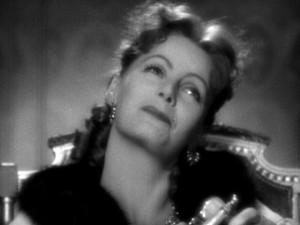 Analysis by a Canadian: Rhett Miller
Analysis by a Canadian: Rhett Miller
It has been cited as her favorite film, and is indeed one of her final ones, and in many ways Camille rises above being just mere film and instead a statement by Greta Garbo herself. Known for being a recluse, Garbo fabricated a mystique from the unknown. Her silent films were very much based on her exotic beauty. Only seen an never heard, she was a fresh Swedish import at a time when American films were all about Americans. Much of the mystique lay in the fact that her voice was never heard in the silents, making her such a cultural curiosity that by the time her first film rolled around, it was promoted almost entirely on the fact that she speaks. She continued to build a legend for herself with her longstanding affair with John Gilbert and her refusal to disclose information about her private life, but the biggest mystery came in her retirement. She had only been working in films a little longer than ten years when she made Camille, and for it she received her highest salary. Three films and a few years later, she would retire at thirty six.
The stress of the press, the strain of the Hollywood lifestyle and the heartbreak of tinsel town relationships are likely the three reasons that drove her out of the movies, but one will never know the true answer. She seemed to just be sick of the whole lifestyle, and that is where her character in Camille seems to be the most obvious Garbo surrogate. In Camille, Garbo plays Marguerite Gautier, a classy woman who falls victim to sickness and to an overall disenchantment with life. She falls in love, sort of, but complications with in-laws and with money deny her the pleasure of marriage. She spends much of the latter portions of the film alone and in bed, away from everything. Her former flame comes back to her and expresses his love, but it is too late. She dies in his arms.
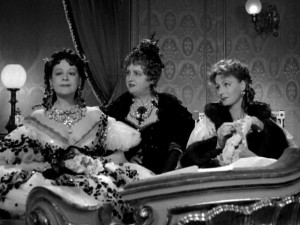 Right from the outset, her reclusive character and classy demeanor hint to the fact that Garbo is very much playing herself. She spends much of the film alone, as she would the rest of her retired life. She never married, and chose instead to live almost in hiding in her New York apartment. It is rumored the last few years of her life were spent almost without contact with anybody. Her not getting together with Armand Duval (Robert Taylor) at the film’s end further shows her detached perspective on relationships. She was a woman who exuded an aura all and to herself. To let anyone else into her life would dispel the mystery behind her personality. Isolated and without husband is how she chose to live her life, and she acts the part with eerie precision in Camille.
Right from the outset, her reclusive character and classy demeanor hint to the fact that Garbo is very much playing herself. She spends much of the film alone, as she would the rest of her retired life. She never married, and chose instead to live almost in hiding in her New York apartment. It is rumored the last few years of her life were spent almost without contact with anybody. Her not getting together with Armand Duval (Robert Taylor) at the film’s end further shows her detached perspective on relationships. She was a woman who exuded an aura all and to herself. To let anyone else into her life would dispel the mystery behind her personality. Isolated and without husband is how she chose to live her life, and she acts the part with eerie precision in Camille.
Most reflexive on her own career as an actress though, are her dying words in the film. “Perhaps it would be best if I lived in your heart…where the world can’t see me.” It is Marguerite talking to Armand, but really, it is Garbo talking to her audience. She was a woman of mystique, and often just the thought of her – what she was thinking, what she liked in real life, all those things – very much eclipsed her performances as an actress. Thus, if she were to retire, her enigmatic wonder would live on long after her success as an actress. Imagine if De Niro retired after Raging Bull, or if Nicholson hung it up after One Flew Over the Cuckoos Nest. They’d never age, their star going out burning its brightest.
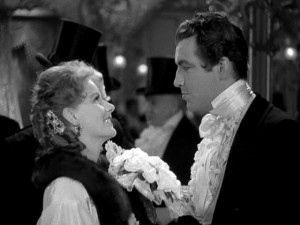 James Dean immediately comes to mind, but Garbo went out by choice. She was at her peak and she simply retired to a place where “the world [could not] see [her]”. She wanted her privacy, she wanted her work to speak for itself, but more importantly she wanted her legend to live on. In her retirement she may have missed out on a number of solid future roles, but her mystique remains as potent today as it likely ever was. More than an actress or a tabloid pinup, she was a persona. Camille is her eulogy, quiet, but telling.
James Dean immediately comes to mind, but Garbo went out by choice. She was at her peak and she simply retired to a place where “the world [could not] see [her]”. She wanted her privacy, she wanted her work to speak for itself, but more importantly she wanted her legend to live on. In her retirement she may have missed out on a number of solid future roles, but her mystique remains as potent today as it likely ever was. More than an actress or a tabloid pinup, she was a persona. Camille is her eulogy, quiet, but telling.
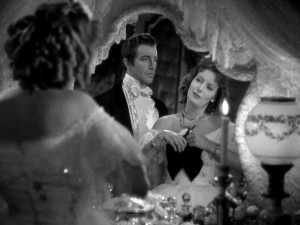 Analysis by an American: Shawn McLoughlin
Analysis by an American: Shawn McLoughlin
Seeing as how this has been a banner year for DVD releases of older films (or at least my discovering of them) it was with pretty high hopes that Warner’s new Garbo set would be full of old-time goodness. The type of goodness reserved only for melancholy film buffs like myself that romanticize films from an era they weren’t even alive during. So it was with some surprise that George Cukor’s Camille just simply didn’t impress me.
The story of the rich girl that can choose between happiness and financial wealth (but not both) based on the suitor she chooses has been done to death. I would wager it wasn’t even all that original when this film was released in 1936; after all, it was a remake. Greta Garbo’s performance as the lead character Marguerite Gautier is enjoyable enough. But playing the ill-fated courtesan didn’t seem all too daunting for her. She certainly aged gracefully, this being one of her final films she is still stunning, but there is nothing else to warrant much attention. Robert Taylor’s role as Garbo’s man-bitch is portrayed authentically enough. By that I men, I could see him really being a man-bitch like that. But the character is every lovelorn male in every film. If it were the 60’s he would be painting portraits and wearing tight black shirts and berets, pining over one of his own models. The character is nothing new. Lionel Barrymore’s bit part as Armand’s father was nice enough, but the scene is overwrought with melodrama that wouldn’t even be used in the sappiest of modern films.
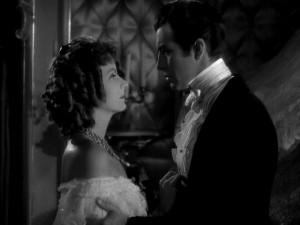 Perhaps it is part of Camille’s appeal in both a novel and film that the story is simple and romantic. Simple and romantic can work. Especially if you want to compare this to Baz Luhrmann’s Moulin Rouge, which uses the same characters in a different setting, but entertains still by giving a stronger presence to the supporting characters and actually defining them. The only defined supporting cast here is the Baron de Varville who it is at least alluded to that there is a sadistic nature to. He’s the anti-gentleman. He realizes that Marguerite does not truly love him, yet he enjoys teasing her – dangling monetary wealth in front of her as an addiction. But all things considered, the film isn’t a total flop. There are a few really entertaining bits in the script. The mocking of some of the clothing and a little witty repartee are all highlights. Probably the best scene is with the Baron as he is playing the piano while Marguerite pretends to desire him as Armand rings the doorbell. The desperation and sadness is perfectly conveyed in Garbo’s laughter and the maniacal nature of the Baron is displayed there as well.
Perhaps it is part of Camille’s appeal in both a novel and film that the story is simple and romantic. Simple and romantic can work. Especially if you want to compare this to Baz Luhrmann’s Moulin Rouge, which uses the same characters in a different setting, but entertains still by giving a stronger presence to the supporting characters and actually defining them. The only defined supporting cast here is the Baron de Varville who it is at least alluded to that there is a sadistic nature to. He’s the anti-gentleman. He realizes that Marguerite does not truly love him, yet he enjoys teasing her – dangling monetary wealth in front of her as an addiction. But all things considered, the film isn’t a total flop. There are a few really entertaining bits in the script. The mocking of some of the clothing and a little witty repartee are all highlights. Probably the best scene is with the Baron as he is playing the piano while Marguerite pretends to desire him as Armand rings the doorbell. The desperation and sadness is perfectly conveyed in Garbo’s laughter and the maniacal nature of the Baron is displayed there as well.
The direction is pretty stale as well. Reflecting back on a film I finished watching less than twenty minutes ago, I would hope to mention one or two scenes that at least gave the impression of dynamic photography. But there wasn’t any, or at least none that springs to mind. Ultimately, I think that Camille is little more than a fluff piece in Hollywood history. It’s nothing to consciously avoid, but it is probably best reserved for watching at 3 AM. on TCM instead of rushing out to rent or buy.
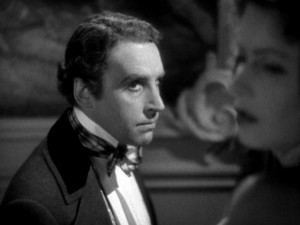 Analysis by a lawyer: Richard Stracke
Analysis by a lawyer: Richard Stracke
Camille disappoints because it never strives to be more than a straight forward literary adaptation. It is always competent, rarely ambitious and almost never wondrous. I’ve not read the source novel, but I expect that Cukor or his screen writers removed much of its poetry in an attempt to make a crowd pleasing feature film. The results may have the 1930s audiences, but looking at it with 21st century eyes, I see a predictable, non cinematic film. If it weren’t for Garbo and the other leads, it would be indistinguishable from hundreds of other weepies.
Before getting into the flaws, I must give praise where it is due. Garbo has a luminous presence. By this point, she was not just an exotic beauty, but an established talkie actress. I selected this film because I’d read that it was one of her strongest dramatic performances. She’s the type of actress who can manipulate her audience with a simple twist of the hair or subtle change in expression. That sort of power was on display here. She may not have the dramatic range of a Hepburn, but when you have her level of screen presence it doesn’t matter.
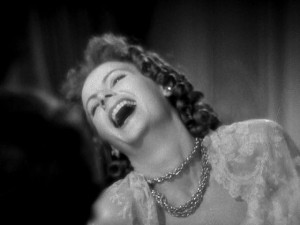 The rest of the cast pales in comparison. Based on the trailer, Robert Taylor, the love of her life, was quite the dapper matinee idol. I’ve heard of him, and surely seen him in other roles, but he doesn’t stand apart from dozens of other men who fell into the foppish Henry Fonda in The Lady Eve role. Like most else with the film, he’s adequate and at times his deer in headlights, love struck gaze exhibits charm, but I imagine there was a line of eager boys who could have played the role just as easily.
The rest of the cast pales in comparison. Based on the trailer, Robert Taylor, the love of her life, was quite the dapper matinee idol. I’ve heard of him, and surely seen him in other roles, but he doesn’t stand apart from dozens of other men who fell into the foppish Henry Fonda in The Lady Eve role. Like most else with the film, he’s adequate and at times his deer in headlights, love struck gaze exhibits charm, but I imagine there was a line of eager boys who could have played the role just as easily.
The villainous duke fares slightly better, but I was mainly engaged by his similarity to the wicked duke of the recent Moulin Rouge! Both men share a snivel that while never actually ‘evil’ is just enough to turn audience sympathies. I wish that he could have been a little wickeder. I’m sure that Cukor was restrained by the production code, but other than the fact that Garbo didn’t actually love him, his wealth and less than dashing personality, the only reason he was ‘bad’ was that he wasn’t Taylor. It wasn’t like he beat her or locked her away from society. THOSE are the type of villains that drive these films. I want to hate the bad guy, not just prefer poor little pretty boy. The setup is now incredibly cliché within the genre, but I wish someone would make a film that cast these “lucky at cards, but unlucky in love” fellows in a more positive light. Think of the possibilities. Sensible baron sits at home broken hearted while trophy mistress gallivants around the country side with a penniless hunk who will surely never be able to provide any non-sexual gratification. Such a film could climax when she finally comes to her senses and leaves her wild child for a life of super bourgeois luxury.
As far as the film’s themes go, they were surely better examined in the novel. The eternal choice between luxury and love was constantly with us, but not examined in any depth. As seems typical with Cukor, he seems more satisfied with falling within studio guidelines than creating something more atmospheric or subversive. There are a few pretty pastoral shots, but much of the film is indistinguishable from countless other studio productions from the period.
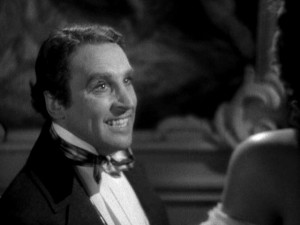 This raises a question that is applicable to films of all eras. Is presentation and cinematic technique more important that old fashioned story telling? Camille is certainly a good story, but without containing anything truly unique to the medium, it can never be classified as anything more. I’m not advocating that films should be all flash and film school hi-jinks, but when I see a FILM I want to remember some of the cuts or shot composition or lighting or… For better or worse, a good story isn’t enough. If I want a tepid melodrama I can turn on Lifetime. Camille only heightens my appreciation for Sirk and genre directors. They take potentially tired material and breathe new life into it with their own brand of cinematic devices. Cukor seemed content to go on autopilot and his film suffers for it. This brand of lazy, workmanlike filmmaking still plagues the industry. While it may not be enough to ‘ruin’ a film, it keeps it from being the sort that I’d return to and more importantly, from being the sort of old movie that I prod my friends to take the time to see for themselves.
This raises a question that is applicable to films of all eras. Is presentation and cinematic technique more important that old fashioned story telling? Camille is certainly a good story, but without containing anything truly unique to the medium, it can never be classified as anything more. I’m not advocating that films should be all flash and film school hi-jinks, but when I see a FILM I want to remember some of the cuts or shot composition or lighting or… For better or worse, a good story isn’t enough. If I want a tepid melodrama I can turn on Lifetime. Camille only heightens my appreciation for Sirk and genre directors. They take potentially tired material and breathe new life into it with their own brand of cinematic devices. Cukor seemed content to go on autopilot and his film suffers for it. This brand of lazy, workmanlike filmmaking still plagues the industry. While it may not be enough to ‘ruin’ a film, it keeps it from being the sort that I’d return to and more importantly, from being the sort of old movie that I prod my friends to take the time to see for themselves.
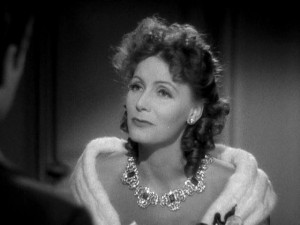 Analysis by an elitist: Adam Lippe
Analysis by an elitist: Adam Lippe
The mystique around Greta Garbo is no different than the one surrounding James Dean. Both ended their careers at the height of their fame, one by choice, one not. Therefore, each film they made has a certain weight attached to it, the generic qualities overlooked in order to be described as a “classic,” without actually earning the praise. Garbo’s Camille fits neatly into this scenario, it is not an extraordinary film, it breaks no new ground, but it is adequate entertainment, and those unfamiliar with Garbo would be unlikely to damn it, as it never stoops to being embarrassing.
Camille is unlikely to have been a pioneer in any way, though it features characteristics that would be used for years in Hollywood films that followed. Garbo’s character, Marguerite Gautier is supposedly ill throughout the entire movie, but she retains her glamour throughout, and eventually dies of an unspecific disease, which seems to resemble exhaustion from a cold. We only see her coughing, and even the introduction of the illness is unclear, the movie jumps around so much in the first act, that there is no way to know that one scene is six months later than the previous one, other than the stated fact halfway through. There is immense confusion regarding the Baron, it implies that he’s been with her for the entire time, but it is revealed that only Armand Duval has visited her in the hospital. This brings up the question of how it is that the Baron and Marguerite were able to bond as a couple if during the entire time she was sick, he never came to see her. Their intimacy in the scene that follows the first theater sequence suggests that they have been around each other intensely, and she has already forgotten about Armand and moved on. These sorts of time compressions appear to be the result of trying to adapt a book, leaving in the major events, but trimming the transitions and mood building sequences.
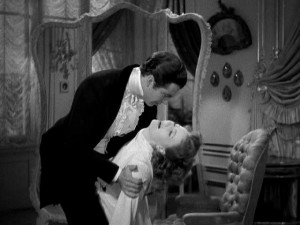 These problems of condensing create one of the film’s larger problems, the scene of false crisis where Armand’s father tries to convince Marguerite to let him go for his own good. The sequence is very forced, it appears that it was only included to break the lovers up when they were at their most happy, just to set up the tragic conclusion. While it is believable that Marguerite would not want to hurt Armand, the fact that she would throw it all away on his father’s whim, a man she has never met, is hard to swallow. It certainly would have helped if the father had more than one scene of development previous to his declaration to Marguerite. This is another one of those motifs that appeared in many romantic comedies of the last 70 years, where the lovers meet and fall in love, and the screenwriters must concoct and contrive as many ways as they can to have them apart so the final scene has more dramatic weight. It is always phony and false, and certainly would be more challenging to show the couple together and slowly moving apart through time with each other, not trying to prove that absence makes the heart grow fonder.
These problems of condensing create one of the film’s larger problems, the scene of false crisis where Armand’s father tries to convince Marguerite to let him go for his own good. The sequence is very forced, it appears that it was only included to break the lovers up when they were at their most happy, just to set up the tragic conclusion. While it is believable that Marguerite would not want to hurt Armand, the fact that she would throw it all away on his father’s whim, a man she has never met, is hard to swallow. It certainly would have helped if the father had more than one scene of development previous to his declaration to Marguerite. This is another one of those motifs that appeared in many romantic comedies of the last 70 years, where the lovers meet and fall in love, and the screenwriters must concoct and contrive as many ways as they can to have them apart so the final scene has more dramatic weight. It is always phony and false, and certainly would be more challenging to show the couple together and slowly moving apart through time with each other, not trying to prove that absence makes the heart grow fonder.
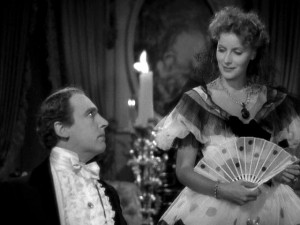 The issues of plausibility do not, however, get in the way of the snappy dialogue, which is a big surprise for such a standard melodrama. Even the way that Prudence is portrayed, initially as trying to think the financial best for Marguerite, but eventually shown as callous and uncaring when she asks for money on her deathbed, is still given amusing lines. The funniest scene in the entire film is when she stumbles around drunk, trying to get the other party guests to come to her house to continue the party, and at the same time take the prepared food with her, and she utters, “Somebody bring the cheese!” Even sharper are some of Marguerite’s rejoinders such as, “You’re killing yourself. If I am, you’re the only one who objects.” Her strange jealous relationship with Olympe results in a number of these sorts of lines, but it also adds a lot of humanity to her character, and not such a saintly martyr. Her attitude is what gives the film life, not just that she is resigned to die and have fun while she does it, but a willingness to appear flawed even in comparison to the selfish characters surrounding her.
The issues of plausibility do not, however, get in the way of the snappy dialogue, which is a big surprise for such a standard melodrama. Even the way that Prudence is portrayed, initially as trying to think the financial best for Marguerite, but eventually shown as callous and uncaring when she asks for money on her deathbed, is still given amusing lines. The funniest scene in the entire film is when she stumbles around drunk, trying to get the other party guests to come to her house to continue the party, and at the same time take the prepared food with her, and she utters, “Somebody bring the cheese!” Even sharper are some of Marguerite’s rejoinders such as, “You’re killing yourself. If I am, you’re the only one who objects.” Her strange jealous relationship with Olympe results in a number of these sorts of lines, but it also adds a lot of humanity to her character, and not such a saintly martyr. Her attitude is what gives the film life, not just that she is resigned to die and have fun while she does it, but a willingness to appear flawed even in comparison to the selfish characters surrounding her.
Adam Did anyone else find it refreshing to find such an openly gay character portrayed? And it was probably how the Christian version of the new meaning of gay was devised when she was on her deathbed. The guy who put the money in her purse.
Rhett “I used to think you were a gay fellow without other thoughts but of pleasure.” “Well, it’s true.” I wrote them down those lines were so good
Richard I didn’t write them down, but I remember getting a good chuckle.
Adam Now she’s referring both to his temperament and the fact that he was effeminate, as well as thinking of gay men as only interested in pleasure.
Shawn I just thought the term was more commonly used then.
Adam It was. As in the opening crawl.
Shawn But he was very gay. So the shoe fits.
Rhett Happy thus equates with being horny.
Shawn Clever, but I paid this no mind.
Adam What did you pay mind to?
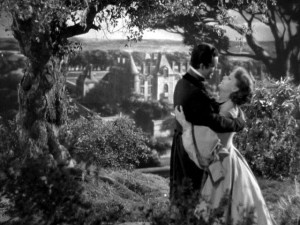 Richard Also of interest was that in Queen Christina, Garbo plays the not so subtle bi-sexual so, even though the code had kicked in by Camille, she and her buddies were clearly in touch with that aspect of society.
Richard Also of interest was that in Queen Christina, Garbo plays the not so subtle bi-sexual so, even though the code had kicked in by Camille, she and her buddies were clearly in touch with that aspect of society.
Rhett Is that actually acted on or just subtext?
Richard In QC? At the start of the film she has no intention of marrying, wears men’s clothes and is mainly interested in going sledding with her female servant. they have a falling out when she sees said girl with a man.
Shawn I paid attention to how Garbo can look beautiful and ugly at the same time.
Adam She’s a Jolie.
Shawn And mostly how she looks better when she is going through hell.
Adam She was dying of movie disease where everything is solved by overlighting and soft focus, so the star always looks glamorous no matter the illness.
Rhett Okay, so her bisexuality is more implied there. Still interesting though.
Shawn Yeah, she even died beautifully.
Adam Was she supposed to have bloodless TB? That was non-contagious.
Shawn I think it was the clap.
Rhett When you said movie disease I thought you were going to talk about how she was very much playing herself, sick of being in the movies.
Shawn Which is why she never slept with her love.
Adam The movie itself is a metaphor for her career?
Rhett Well, maybe just her death.
Richard I assumed she had consumption, but is that just TB?
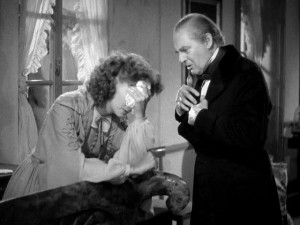 Adam If, as was suggested on IMDB, this was her favorite, I don’t think she would have phoned it in.
Adam If, as was suggested on IMDB, this was her favorite, I don’t think she would have phoned it in.
Rhett I wrote down the end quote “perhaps it would be best if I lived in your heart…where the world can’t see me.” Not phoned in, no, but just like a swan song of sorts giving this to her fans before she would go into recluse.
Shawn Yeah, that was a great quote. I thought along that line as well. But it wasn’t really her last film. Although it was close.
Adam But she made three more films over five years and the last one has the most apropos tagline “Go gay with Garbo!”
Rhett It seems every film of hers used her in the tagline. Garbo Talks! Garbo Laughs! So what would this one be? Garbo Dies!
Adam Garbo Menstruates! I guess this one would be Garbo Coughs!
Rhett Perhaps it was with this film that she realized she had achieved everything she wanted to achieve, and was just looking for a way out since she liked it so much. With the others she realized she couldn’t equal her work here.
Adam But what is really so special about her work here? Yes, there are some clever lines, but she is just moviestarring it up.
Richard That’s what I couldn’t get either, Adam. I didn’t mind the film, but it wasn’t as memorable as I hoped.
Shawn Yeah, this was extremely average.
Richard No real memorable shots or even exceptional scenes, just a decent literary adaptation with a solid cast.
Rhett Yeah, I don’t know why she considers it her favorite there just didn’t really seem to be anything of substance in it above your typical love story.
Adam Does anyone know about the trajectory of the novel?
Shawn I actually skimmed the silent film version on the DVD and I thought some of the older scenes were better framed.
Adam While the notion of women’s only interest being marriage is commonplace for the era some of the uses of time were confusing such as the jump forward after the theater scene.
Richard Some of her earlier stuff was more subversive, so I was hoping for more of that. Sirkian touches I guess. Maybe the code killed all of that.
Rhett “It’s a big mistake for a woman to have a heart bigger than her purse!”
Adam And then she’s been sick for 6 months. Perhaps there was more in the book.
Shawn I wish they would have used the ugly competitor more often.
Adam Especially about the father and his strange request.
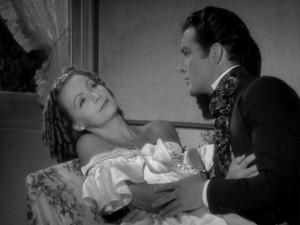 Rhett The movie seemed to jump right into things too.
Rhett The movie seemed to jump right into things too.
Shawn She was at least amusing.
Rhett I didn’t feel as if I knew enough about these characters to suddenly be thrust into this relationship.
Richard Yeah, the father scene was very awkward.
Adam Especially because he’s never met her before.
Rhett Considering one of the major elements of a romance is catching up with the lovers when they first meet, not when they are in mid relationship.
Richard I don’t know much about the novel, but I assume this distilled the big plot points and cut the character development/subtleties in favor of being audience friendly or entertaining.
Rhett Yeah, definitely seems that way.
Richard Banking on the fact that Garbo would carry it regardless.
Rhett And she kind of does.
Shawn And having a star-studded walk-in with Barrymore.
Richard Yeah, she’s probably the only reason people still see it. I mean, she was why I wanted to watch it.
Rhett I think I saw drew bulging out of his pants in one of the shots.
Adam But Shawn, he has such a nothing scene with his son before that. He isn’t used very well.
Shawn Oh, I agree. Barrymore was there just to have another name on the marquee. If he was present for at least two scenes more before the time he visits her, it would have had deeper meaning.
Adam Exactly, I had a really hard time buying that she would just follow what he said.
Richard Speaking of story and all, were audiences of that day satisfied with a good story rather than expecting something really cinematic? I don’t remember anything that couldn’t have been done on stage and that disappointed me, but I guess that’s Cukor. He’s not exactly known for style.
Rhett Well, this was before television, so there was still the luster for just story-driven stuff at least the camera moved…it could have been a lot drabber.
Shawn Yeah, it moved. But it certainly wasn’t as dynamic as other films of that era.
Adam Richard, it would have been difficult to have the musical going on in the background on stage.
Rhett Well, the camera was probably more static in the 30s than in any other decade.
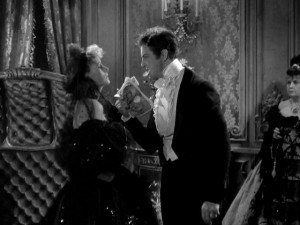 Richard I guess I was expecting something closer to Dietrich’s Von Sternberg stuff. Does anyone know when it was re-released? The trailer was one of those ‘you loved it then… see it again!!!’ deals.
Richard I guess I was expecting something closer to Dietrich’s Von Sternberg stuff. Does anyone know when it was re-released? The trailer was one of those ‘you loved it then… see it again!!!’ deals.
Adam Shawn, you were saying you wanted more with the rival, do you think that really would have helped? I thought there was just enough back and forth and she has that one hilarious monologue, trying to impress the baron.
Shawn No, but it would have maybe added some more drama. Even if it did so accidentally. Yeah, there could have been a bit more drama in that respect.
Adam As well as the line where she says he was looking at her the whole time.
Rhett There didn’t seem to be much conflict throughout most of the film.
Adam And Garbo says “Perhaps that’s when he smiled at me.” The conflict was very much of the contrived self-inflicted type.
Shawn Oh it’s a great line. I wish there was more of that type of greatness.
Adam There is very little attention paid to the expenses issue.
Rhett A technical issue I noticed in the film was that it was full of jump cuts. It kind of took away from the glossy production.
Shawn Yeah, they make her out to be broke, or getting there, but never focus on it.
Rhett Some really bad cutting on the action too.
Richard I agree with Adam. I never felt engaged by the conflict. it seemed forced and abrupt (sort of like the Barrymore scene— why listen to him? To add some drama).
Adam I kept thinking about those forced romantic comedies, where the lovers meet in the first scene and the screenplay has to contrive reasons to keep them apart turning it into a gimmick, rather bothering to establish characters. At least we were spared the scene where she explains about the father.
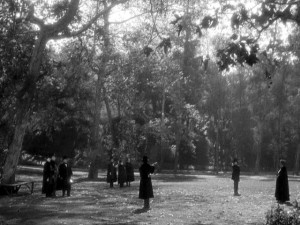 Rhett I had just watched Valley Girl before watching this, and that has one of the most obvious examples of splitting apart the main characters without any logical reasoning.
Rhett I had just watched Valley Girl before watching this, and that has one of the most obvious examples of splitting apart the main characters without any logical reasoning.
Shawn Dude, she’s from the VALLEY. That’s the whole point. Princess and the punk don’t mesh.
Rhett One minute they are montaging to Melt With You and then the next scene she just yells at him and tells him to get out. Even then it makes no sense, because she gets back with the asshole boyfriend who her friend encourages, even though she has almost been raped by him.
Shawn It is almost the same movie.
Adam I would have killed to see Garbo sing Melt With You. Especially with a tinge of a Russian accent.
Shawn Mmmm Mmmm Mmmm Mmmm Mmmm Mmmmmmmmmm.
Adam Here was something that confused me in Camille; the maid just comes to the country? Were they paying her? And with what?
Rhett I was somewhat confused by the monetary side of things too.
Shawn That’s what made no sense. None.
Rhett It seems like she was poor, but yet she seemed to have a lot of money
Shawn How could she afford…Everything…? “I feel like buying a horse today.”
Adam Or are we to assume that in Paris, in the 1850s, maids are completely loyal no matter what?
Rhett And then that other fellow would just give her money even though she ignored him.
Richard I assumed it was just that they wanted to keep the maid in the film and were too lazy to really justify how to keep her around. Were audiences of that day so accepting that they wouldn’t notice those things or maybe so involved with the meat of the story that they didn’t care about the details?
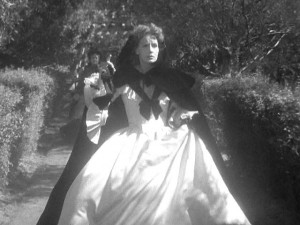 Adam It isn’t clear how any of the single women afford anything. The rival woman, Olympe, she is at every social function but with no supporting man.
Adam It isn’t clear how any of the single women afford anything. The rival woman, Olympe, she is at every social function but with no supporting man.
Shawn Same way they do today. They pay with pussy.
Adam There isn’t even the implication of sex. Olympe doesn’t seem to be able to land anyone, even for sex.
Rhett It just seemed to be so boring being a woman since they didn’t do anything. Like not even leisure things they just kind of sat there wondering if they were being looked at.
Richard “They just kind of sat there wondering if they were being looked at.” That’s sort of like me in class. Not a bad way to live.
Adam When I was in college I read a lot of those sorts of novels for a class. Edith Wharton stuff like The House of Mirth and The Age of Innocence and The Coquette, all about the search by the aging single woman to find a man or she will be poor and die. But there wasn’t even any real desire for that in Camille. No feeling that it was a must, or required.
Richard That was my issue, Adam, it seemed that it didn’t really matter what would happen, almost like we were expected to cry just because she was going to die.
Rhett Kind of like Garbo herself, since she never got married, nor seemed to have any interest in it. It doesn’t matter what happens in her life…she just wants to disappear.
Shawn The bane of stardom.
Adam I’d imagine like with Fred Astaire, we’ll see Garbo dancing with a vacuum cleaner in a commercial at some point.
Shawn I’m surprised she hasn’t already.
Richard Did she do anything publicly during the final 50 years of her life?
Shawn She penned her biography in 1990. Maybe that would account for the final 50 years.
Adam Was Cukor known more for simply being a workmanlike director? I was surprised that a filmmaker who has so many notable films on his resume did something so visually flat and indistinctive.
Richard He’s known for lots of ‘women’s films.’ They’re generally all indistinctive, at least what I’ve seen.
Rhett A Very Gay Director.
Shawn He did just as many non-popular forgettable films though.
Rhett I’d say his resume is pretty impressive for the type of films he made.
Shawn In size or content?
Rhett Born Yesterday, Adam’s Rib, The Philadelphia Story, etc.
Adam Well he graduated to musicals later, like My Fair Lady and A Star is Born, directed most of Gone With the Wind.
Rhett Haven’t heard of that one.
Shawn Sounds boring.
Adam It’s a sleeper.
Shawn I’ll say. It’s damn near 4 hours.
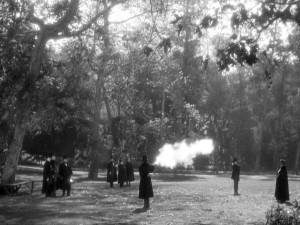 Adam Most importantly, he directed Marilyn Monroe’s only nude scene in the unfinished Something’s Got to Give.
Adam Most importantly, he directed Marilyn Monroe’s only nude scene in the unfinished Something’s Got to Give.
Richard Is that movie known for anything else? I haven’t seen much of MM’s work because a lot of it seems forgettable other than her presence.
Adam Not much different than Garbo?
Shawn It’s known for her dying during the filming. Though not while filming. They didn’t bother with a Bruce Le or Bruce Li situation, as the film obviously wasn’t the caliber of Game of Death.
Rhett Charlize Theron should finish it.
Adam All blond women look alike.
Shawn Just like black people.
Richard And Asians.
Rhett And identical twins.
Shawn That’s not true. My identical twin looks nothing like Rhett’s.



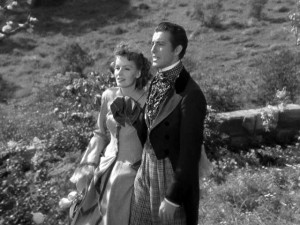

Lee Jones says:
July 26th, 2018
2:28 pm
It’s my favorite Garbo movie, despite being somewhat depressing. There’s an odd mixture of happiness and grimness in this film that seems right for a story about a courtesan – especially for this film. Oh well. All I know is that I enjoyed it very much.